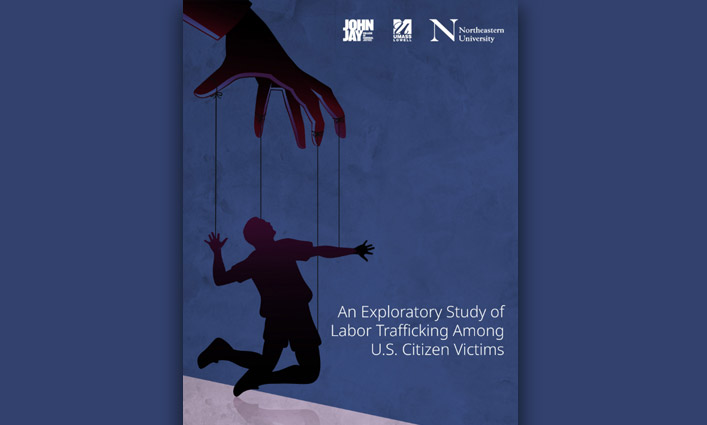
(New York, NY) -- Funded by the National Institute of Justice, an exploratory study, that for the first time, focused on U.S. citizen labor trafficking examining how U.S. citizens experience exploitation and labor trafficking victimization, what makes them vulnerable to victimization and how U.S. citizen labor trafficking victims seek help in exploitative labor situations.
As the COVID-19 pandemic stretches on various narratives have been posited to explain why low-wage workers are not returning to the workforce. While not the focus of the study, the results suggest that low-wage workers experienced exploitive labor conditions prior to the COVID-19 pandemic and may be less likely to return to these workplaces due to fears about continuing exploitation and abuse. These finding underscore the need for fair wages and oversight of industries where abuses have been more prevalent. The team was comprised of researchers from John Jay College of Criminal Justice, Northeastern University, and the University of Massachusetts Lowell.
Unlike previous research on labor trafficking, this study focused specifically on U.S. citizens rather than foreign born undocumented or temporary workers in the United States. U.S. citizens may face exploitative practices that fall under a range of labor law violations, such as wage and tip theft, pay deductions, and unsafe and hazardous working conditions. They also experience abusive labor practices that meet the legal definition of labor trafficking, including restriction of movement and communication, violence and abuses of a sexual nature.
Using survey data from 240 individuals in Anchorage, Alaska, San Diego, California and the Northeast Corridor (New York City and Boston), the researchers found:
- Levels of sexual abuse in the workforce were considerably higher than seen in previous labor trafficking research.
- Workers experienced multiple forms of exploitation across a number of different jobs.
- A history of violence in the home was the biggest risk factor for those who experienced exploitation and abuse in the workplace.
Additionally, workers with the highest risk of experiencing labor trafficking victimization included those with housing insecurity, those who were formerly incarcerated, and those working in the construction, food service, retail, or janitorial industries. Other participants described delays in payment, deception, lies, intimidation, threats, restrictions of physical and communicative freedom, and sexual abuse from their employers.
For survey respondents who experienced victimization, a majority (69%) stated that they never sought help regarding their exploitative work conditions. When participants did seek help they reached out to individuals in a position of authority at work, such as managers, supervisors, bosses, and human resources. In most of these cases, respondents were not looking to leave their jobs but instead improve the negative conditions they were experiencing.
The researchers put together a series of recommendations to help improve the identification of and response to U.S. labor trafficking victims and inform future research on this important and underrecognized area of victimization.
Recommendations come largely from the voices of interview participants and service providers.
The recommendations include:
- Increasing education and reporting options for workers.
- Improving service providers’ and law enforcement agencies’ competencies at recognizing labor trafficking.
- Increasing trust of the U.S. legal system.
- Regulating and enforcing existing labor protection laws.
- Making labor trafficking of U.S. citizens visible.
- Addressing victims’ underlying needs and vulnerabilities.
“We conducted the study in order to begin to fill a huge knowledge gap regarding the labor trafficking experiences of U.S. citizens,” said lead Principal Investigator Dr. Meredith Dank, Research Professor at John Jay College. “We hope that the findings and recommendations from the study can help practitioners and law enforcement better identify US citizens who have been labor trafficked. Additionally, our goal is to provide policymakers with the necessary information to create and strengthen existing policies and laws to prevent this from happening now and in the future.”
About John Jay College of Criminal Justice:
An international leader in educating for justice, John Jay College of Criminal Justice of the City University of New York is a Hispanic Serving Institution and Minority Serving Institution offering a rich liberal arts and professional studies curriculum to 15,000 undergraduate and graduate students from more than 135 nations. John Jay is home to faculty and research centers at the forefront of advancing criminal and social justice reform. In teaching, scholarship and research, the College engages the theme of justice and explores fundamental human desires for fairness, equality and the rule of law. For more information, visit www.jjay.cuny.edu and follow us on Twitter @JohnJayCollege.
About the National Institute of Justice
The National Institute of Justice (NIJ) is the research, development and evaluation agency of the U.S. Department of Justice. NIJ is dedicated to improving knowledge and understanding of crime and justice issues through science. NIJ provides objective and independent knowledge and tools to inform the decision-making of the criminal and juvenile justice communities to reduce crime and advance justice, particularly at the state and local levels. The research discussed in this release was made possible by Award Number 2017-VT-BX-0002, awarded by the National Institute of Justice, Office of Justice Programs, U.S. Department of Justice. Opinions or points of view expressed on this site represent a consensus of the authors and do not necessarily represent the official position or policies of the U.S. Department of Justice.
About Northeastern University
Located in Boston and founded in 1898, Northeastern is a private, nonprofit university that offers degree programs at the undergraduate and graduate levels. Home to more than 35 specialized research and education centers, we are a leader in worldwide experiential learning, urban engagement and interdisciplinary research that responds to global and societal needs.
About University of Massachusetts Lowell
The University of Massachusetts Lowell (UMass Lowell) is a national research university committed to preparing students for work in the real world— solving real problems and helping real people— by providing an affordable, high-quality education. Located on a high-energy campus in the heart of a global community, the university offers more than 18,000 students bachelor’s, master’s and doctoral degrees in five colleges.



